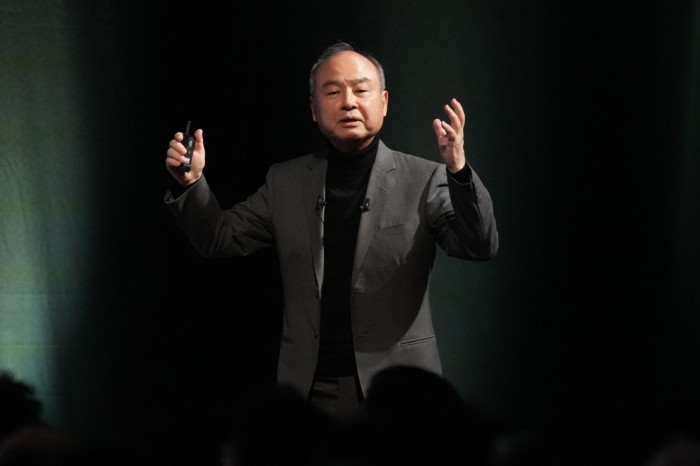Unlock the Editor’s Digest for free
Roula Khalaf, Editor of the FT, selects her favourite stories in this weekly newsletter.
SoftBank was forced to wire $1.5bn to Goldman Sachs and other lenders days before WeWork filed for bankruptcy, as the cost of one of the worst venture capital investments in history has continued to mount for the Japanese group.
The payment takes the total SoftBank has sunk or committed to lend to WeWork above $16bn since its initial investment in 2017, filings analysed by the Financial Times show.
Under chief executive Masayoshi Son, SoftBank and investors in its Vision Fund bankrolled WeWork’s ascent, completing an extraordinary monetary transfer to landlords as well as to employees and other investors who sold their shares to the Japanese conglomerate.
WeWork’s bankruptcy has wiped out most of SoftBank’s investment, although the Japanese group will have a chance to recover a portion of its losses as it converts some of its existing debt into equity in the reorganised company.
The payment on October 31 to lenders led by Goldman was tied to a “letter of credit” SoftBank helped WeWork secure in December 2019, the company’s bankruptcy filing showed. The company at the time was dealing with the fallout of the departure of Adam Neumann, its co-founder and former chief executive, and the fact it had burnt through billions of dollars in investor capital to fund its over-exuberant expansion.
SoftBank in effect co-signed the $1.75bn letter of credit, acting as an obligor alongside WeWork to win over wary risk management committees on Wall Street.

SoftBank executives believed guaranteeing the letter of credit was the best option to keep their existing equity investment alive at the time: it had already invested more than $9bn through its own balance sheet and the Vision Fund by that point.
A critical $6bn loan that WeWork needed and had based its growth plans on had been tethered to a successful initial public offering. When the listing was aborted, the loan slipped from its hands, making the company’s finances perilous. Executives were suddenly staring down the possibility of bankruptcy in a twist that underscored how far the company’s prospects had deflated.
Letters of credit differ slightly from traditional corporate loans, with the banks guaranteeing that a future payment will be made to a third-party even if the company cannot come up with the funds.
That was critical to WeWork after it abandoned its IPO, with landlords pushing for the commitments to make sure they would eventually be paid if something went wrong at the co-working giant.
Given that a majority of the letters of credit remain outstanding — and usually do so for a year from their issuance — roughly $809mn of the $1.5bn SoftBank wired last week was to cover payment requests from landlords that have not yet been made. It is a small portion that could be recovered if landlords for some reason do not tap the banks for payment.
“If those letters get drawn then the banks are entitled to repay themselves for the draw and if they’re not the cash is returned,” one person involved in the matter said.
WeWork, SoftBank and Goldman declined to comment.
The $1.75bn deal led by Goldman in 2019, as well as SoftBank’s decision to pump roughly $3.7bn into the company through debt and equity, helped allay fears that WeWork would immediately go out of business at the start of the decade.
Those investments would not be SoftBank’s last, even as Son pushed his team to tear up an agreement that would have led to the Japanese group buying $3bn of shares in WeWork from insiders and provide it a further $1.1bn of fresh debt financing in 2020.
While Son and SoftBank were able to back out of the debt deal, Neumann and WeWork’s board sued to enforce the tender. The parties eventually reached a settlement that led to SoftBank buying $1.5bn worth of shares in 2021, including $578mn from an investment vehicle controlled by Neumann.
Over the years SoftBank’s delayed draw loans and co-signed letters of credit allowed WeWork to attempt multiple reboots of its business. In 2021, WeWork merged with a blank cheque company to go public, with the equity of the company valued at $9bn. But that figure slid as insiders sold out and WeWork’s own troubles kept mounting, with the pandemic and remote work depressing occupancy rates.
As recently as this March, teams at SoftBank, WeWork and a group of other lenders believed they had come up with a plan to put WeWork on a sustainable footing.
SoftBank agreed to forgive some WeWork debt and swap it for new shares in the group, hoping that this would reduce WeWork’s outlays on interest expenses at a time when the Federal Reserve had raised rates to their highest level in 22 years. SoftBank even agreed to fund $300mn of a new loan in exchange for repayment on a portion of the debt it had earlier provided WeWork.
Other former SoftBank executives have found it difficult to stay away from WeWork after their years of entanglement. Rajeev Misra, who ran the company’s $100bn Vision Fund and aggressively pursued investments in unprofitable start-ups, joined in the restructuring deal this year.
His One Investment Management fund provided $470mn of the high-interest letter of credit banks had extended the company, putting him side-by-side with Goldman, Mizuho, Deutsche Bank, Natixis, Citi, Bank of America, Société Générale and JPMorgan Chase.
Investors are now waiting for SoftBank to report earnings this week, when it is expected to set out details of its losses linked to WeWork.
Additional reporting by Sujeet Indap
